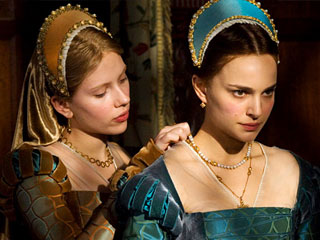The Other Boleyn Girl: It's Good to Be the King!
by M. Faust

The umpteenth version of the story of Anne Boleyn, the woman whom King Henry VIII was so determined to marry that he sundered England from the Catholic church, The Other Boleyn Girl is lurid, preposterous trash with at best an inconsistent connection to the historical characters who inspired it.
It’s also completely irresistible.
I will admit to having had my doubts early on. Natalie Portman and Scarlett Johansson play Anne and her sister Mary, roles in which one might picture Helena Bonham Carter and Cate Blanchett if they were younger. (You know, actresses who didn’t have to study the accent.) Certainly Portman had her work cut out for her, taking a role that has been played in the movies by Vanessa Redgrave, Merle Oberon, Geneviève Bujold and Charlotte Rampling, among many others.
And because movie audiences can’t be expected to have the history of Tudor England at their fingertips, the first reel of The Other Boleyn Girl is so weighted down by clumsy expository dialogue—characters pretending to have conversations that are really meant to fill in back story for the viewers—that I didn’t think the movie was ever going to get up and running.
But it does, and history be damned. The Other Boleyn Girl is based on a novel (the first in a series) by Philippa Gregory. Historians were appalled by her liberal interpretations (not to mention outright fabrications) of Anne Boleyn’s story, but the book was an international best-seller that spawned a whole series.
Surprisingly, it was adapted by Peter Morgan, the British dramatist who has made a name for himself recently as the author of the play Frost/Nixon and the screenplays for The Queen, The Last King of Scotland and the HBO movie Longford. He’s not wholly limited to modern England—he also wrote a 2003 television film about Henry VIII that ran on HBO—and his main task here seems to have been to tone down some of Gregory’s more implausible inventions. Gone is the allegation that brother George was homosexual, or that he was the secret father of one of Anne’s children.
Fans of the book needn’t worry, though: There’s still more than enough verbal catfighting and lascivious behavior to make for two hours of what will surely be the arthouse guilty pleasure of the year.
The other sister is Mary Boleyn, Anne’s older sister and predecessor in the king’s bed. Though what little history recalls of her says she was something of a roundheels, having been the mistress of Francois I of France in her youth, she is here depicted as a dewy-eyed innocent. The Boleyn family has hit hard times, and when her father Sir Thomas (Mark Rylance) learns that the king is on the prowl for a new mistress, he grabs the opportunity to toss her under him (her recent marriage notwithstanding).
Mary’s misgivings fade when Henry’s swyving technique turns out to be rather more advanced than that of her soon-forgotten husband, as we see in a PG-13 sex scene worthy of the Harlequin Seal of Approval. (He even remains until dawn to snuggle!) Soon she’s happily preparing to bear his male child, despite being confined to bed for the duration of her pregnancy—having sired only daughters with his wife, Henry is taking no chances.
None of this sits well with the more ambitious Anne, who had set her own eyes on king’s breeches. (We can tell that she’s one saucy strumpet when she faux-casually works the word “thighs” into a casual conversation with the randy ruler.)
Exiled to France for interfering with a marriage contract, Anne returns to court with a more measured sense of how to lead the king around by his, um, scepter. She has little trouble in luring him away from his baby mama, but that’s not enough: Anne refuses to give him any until he makes him the queen, whatever it may take.
Forget about H. B. Carter and Cate Blanchett—what a vehicle for Joan Crawford and Bette Davis this would have been! Nonetheless, Johansson does purity well enough to leaven Portman’s gleeful ambitiousness. She’s certainly the least innocent Anne Boleyn ever seen on the screen, though the film makes her less of a monster than the book, and allows her some measure of our respect at the inevitable conclusion.
Bana was the star of Ang Lee’s The Hulk, and his Henry resembles Bruce Banner more than the drumstick-wielding butterball familiar from years of movie caricatures. But while he may not turn green and toss motor vehicles around, Henry has a marked tendency to become irrational when his big head is overruled by the little one. (You wonder just who is in charge of England, King Henry or King Johnson.)
As the highborn Ma Boleyn, Kristin Scott Thomas gets the juciest dialogue. “Allowing the men to believe they are in charge—that is the art of being a woman,” she advises her daughter (I forget which). Chastising her weakling husband for pimping out the girls, she wonders, “When was it people stopped thinking of ambition as a sin and started thinking of it as a virtue?” Despairing of justice, she cries, “What is treason? Anything the king and his lawyers decide it to be, on a whim.” (It’s so hard to draw contemporary relevance from these dusty historical tomes…)
High school history teachers will have their work out trying to undo the damage this movie wreaks on their trade, but hey, they can commiserate with the English teachers who get papers on The Scarlet Letter based on viewing the Demi Moore movie.
|
Issue Navigation> Issue Index > v7n9: Shadows & Fog (2/28/08) > The Other Boleyn Girl: It's Good to Be the King! This Week's Issue • Artvoice Daily • Artvoice TV • Events Calendar • Classifieds |









 Current Issue
Current Issue